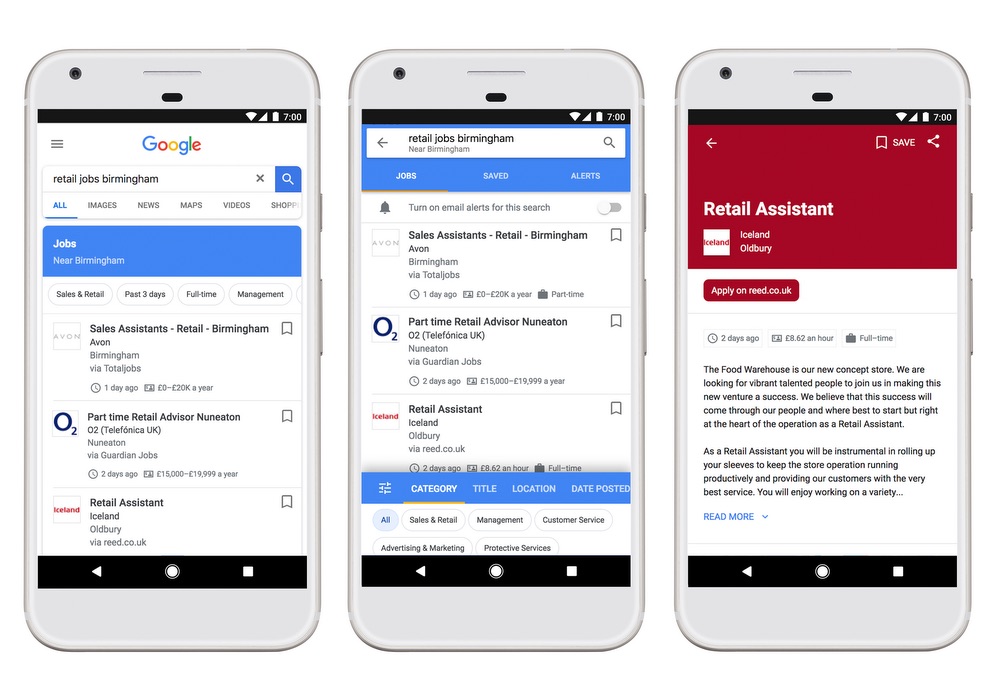What is Google job search and is it good for employers?
New search tool arrives in the UK today after successful launch in the US last year

A free daily email with the biggest news stories of the day – and the best features from TheWeek.com
You are now subscribed
Your newsletter sign-up was successful
Google’s new job searching tool finally arrived in the UK today, following a successful roll-out in the US last year.
The tool scans through opportunities offered through a number of major recruiters, including Reed and totaljobs.com, and collates them for job seekers to scour through.
Much like its search engine, Google’s job section is free to use and will be supported by adverts, says tech blog Gizmodo. Google claims the service displays the same amount of ads as the search engine.
The Week
Escape your echo chamber. Get the facts behind the news, plus analysis from multiple perspectives.

Sign up for The Week's Free Newsletters
From our morning news briefing to a weekly Good News Newsletter, get the best of The Week delivered directly to your inbox.
From our morning news briefing to a weekly Good News Newsletter, get the best of The Week delivered directly to your inbox.
Following the announcement, Joy Xi, product manager at Google Search, told the London Evening Standard: “Job hunting can be challenging – jobs are listed on different sites across the web and it’s not always easy to identify which jobs are suited to your needs or where to find them.
“We know people are turning to Google already to search for job listings, so we wanted to find something [that meets] their needs.”
Google said in a blogpost that “130%” more companies have posted jobs in the search tool since last year’s US launch, which has led to “tens of millions of people around the world” finding work.
The job-hunting tool is available to use today, so here’s everything you need to know about Google For Jobs:
A free daily email with the biggest news stories of the day – and the best features from TheWeek.com
What is it?
Google For Jobs works alongside the company’s pioneering search engine.
According to Mashable, the service launched in the US last June as a way of helping users find jobs using a number of search parameters, such as distance from home and when the position was uploaded.
The tool that has now launched in the UK is almost identical to the US version, only the UK one sorts through positions posted by recruiters located in the same country.
So far, Google has partnered with The Guardian Jobs, The Daily Telegraph, Reed, Gumtree, TotallyLegal, CV-Library, TotalJobs and London-based publisher Haymarket.
But the company says it hopes to attract more job-hosting sites by publishing guides that outline how to ensure new positions appear on the search tool.
How do you search for a job?
Users can start looking for work by typing the name of a company or a job title into Google’s search engine.
One of the first results will be a shortlist of openings under the “jobs” heading. Clicking on the heading leads to a dedicated job-hunting page, where users can refine the search by using parameters such as location, title and the date a position was uploaded.
Other parameters include salary information, the name of the employer and the type of job available such as fixed-term, part-time or contractor.
There are also options to save positions and set up alerts for future job openings.
Is it good for employers?
Recruiters have mostly welcomed the new Google tool. This is primarily because the search giant links to a company’s recruiting page, meaning users can only apply for roles directly through the employer.
Speaking to the Daily Mirror, Mark Rhodes, the director of marketing at job-hunting website Reed, said: “Jobseekers arriving at Reed.co.uk via this new search experience are application-ready, with a high level of intent, so we anticipate seeing a positive impact on the quality and volume of applications we supply to our recruitment clients.”
However, People Management magazine’s editor, Robert Jeffrey, told the BBC that the news “represents a risk” for third-party job-hosting sites.
“Google is a behemoth of search, it controls the gateway to the internet, so I can understand why others feel they have to be part of its jobs service”, he said. “But undoubtedly it will start charging for placement and other premium services.”